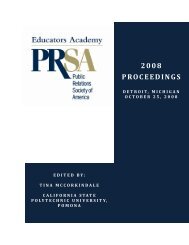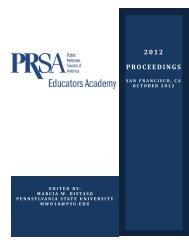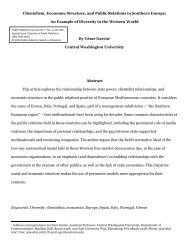2010 - Public Relations Society of America
2010 - Public Relations Society of America
2010 - Public Relations Society of America
Create successful ePaper yourself
Turn your PDF publications into a flip-book with our unique Google optimized e-Paper software.
still smacks <strong>of</strong> news. News coverage still carries the perception <strong>of</strong> being more likely to<br />
report facts.<br />
Business Peoples’ Views on Credibility <strong>of</strong> Independent and Controlled Media<br />
Business people interviewed agreed with public relations pr<strong>of</strong>essionals that independent<br />
news sources are viewed as more credible and accurate than controlled sources, such as paid<br />
advertisements. For many <strong>of</strong> the business people, advertisements or controlled sources represent<br />
a selling tactic designed to influence individuals to purchase something or think a certain way.<br />
In contrast, an independent source has no vested interest in influencing people one way or the<br />
other, they commented. Rather, its intent is simply to report or record news and information from<br />
an unbiased perspective.<br />
An attorney, Karen, experienced in working with consumer products companies, said, "If<br />
it is a paid advertisement, you generally think that advertisers are slanting or interpreting the<br />
facts to suit their desires to show their product or services in a more favorable light."<br />
Advertising executive Rick, who also acknowledged the perceived bias, said, "In an<br />
advertisement, obviously, the message is slanted – not so much slanted, but the message is more<br />
controlled as opposed to something that comes from new source that is from an independent<br />
thinker, or somebody who <strong>of</strong>fers an opinion. So I think that, you know, a newspaper article, even<br />
though it usually comes from only one person, has less bias."<br />
One business executive who holds an MBA degree took an economic perspective in<br />
saying that he generally accepts data that appears in the news item, compared to information<br />
coming from a controlled source. "If you called me up and asked me the best way to make your<br />
building more efficient, I am more likely to give you our press release or, typically, say what we<br />
do is the best way to accomplish that,” Wayne said. In materials they control, businesses “would<br />
tend to stress those things that support their case versus an independent news item," he added.<br />
Reflecting some skepticism about the media, however, Wayne suggested that news sources and<br />
their content may be impacted by their advertisers.<br />
The perception <strong>of</strong> third-party objectivity <strong>of</strong> independent media was cited by several <strong>of</strong> the<br />
business people interviewed. A human resource manager Kelly explained, "At least in theory<br />
you think the third-party media is trying to be objective and is not trying to position a product or<br />
situation or spin it in a certain way, versus a company. I think companies do a lot <strong>of</strong> spin." She<br />
extended the concept <strong>of</strong> spin to companies that use product placement in television shows. "If I<br />
read about a product in a newspaper article, I would hope the media would be concerned about<br />
other things such as objectivity versus the sole focus being on the product.”<br />
Business Peoples’ Views on How Other Business People and <strong>Public</strong> Perceive Credibility <strong>of</strong><br />
Independent and Controlled Media<br />
The business people interviewed generally believed that other business people considered<br />
independent media sources as more credible than controlled sources. At least one person Greg,<br />
however, thought that others may be less critical <strong>of</strong> controlled source information than he<br />
himself was. “Well, my experience is, I am a little more jaded than most people,” he said.<br />
Business people, overall, gave less credit to the general public than themselves or other<br />
business people as being discerning consumers <strong>of</strong> information. Business people suggest the<br />
average person doesn't perceive a difference between information presented by an independent<br />
source or a controlled source.<br />
Credibility <strong>of</strong> Quotations and Customer Testimonials<br />
As a further measure <strong>of</strong> perceptions <strong>of</strong> credibility in news media, interviewees were<br />
asked about attitudes towards quotations and customer testimonials used in media coverage.<br />
71
















